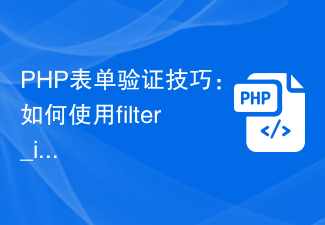 Web Front-end
Web Front-end Vue.js
Vue.js How to use Axios to implement form data submission and verification in Vue projects
How to use Axios to implement form data submission and verification in Vue projectsHow to use Axios to implement form data submission and verification in Vue projects
With the development of front-end development, more and more projects use Vue.js as the front-end framework, and Axios is currently the most popular One of the libraries for sending AJAX requests. In Vue projects, we often encounter scenarios that require submission and validation of form data. This article will introduce how to use Axios to implement form data submission and validation, and provide some code examples to help readers better understand.
First, we need to make sure Axios is installed in the project. It can be installed through the following command:
npm install axios
Next, we need to create a form component and implement data submission and validation in this component. Suppose our form has two input boxes, namely username and password. We need to send these data to the backend for verification when submitting the form. Here is a simple code example:
<template>
<div>
<form @submit.prevent="submitForm">
<input v-model="username" type="text" placeholder="请输入用户名" />
<input v-model="password" type="password" placeholder="请输入密码" />
<button type="submit">提交</button>
</form>
</div>
</template>
<script>
import axios from 'axios';
export default {
data() {
return {
username: '',
password: '',
};
},
methods: {
submitForm() {
// 首先进行数据验证
if (!this.username || !this.password) {
alert('请输入用户名和密码');
return;
}
// 使用 Axios 发送请求
axios.post('/api/login', {
username: this.username,
password: this.password,
})
.then(response => {
// 请求成功处理逻辑
console.log(response.data);
})
.catch(error => {
// 请求失败处理逻辑
console.error(error);
});
},
},
};
</script>In the above code, we first introduced Axios and defined the attributes username and password used to store form data in the data option of the component. In the submitForm method, we first verify the form data. If any input box is empty, a prompt message will pop up and return, terminating the subsequent data submission process. If the data verification passes, use the axios.post method to send a POST request to the backend's /api/login interface, and pass the username and password as parameters of the request.
Subsequently, we used .then and .catch chain calls to process the results of the request. In the .then method, we can handle success situations, such as updating the page content or jumping to other pages. In the .catch method, we can handle failure situations and output error information for debugging.
Of course, in actual projects, we usually need to add some field validation logic, such as checking the length of the user name and password, whether they contain special characters, etc. In addition, we can also add a confirmation dialog box before form submission, as well as loading animation during request, etc.
To summarize, this article introduces how to use Axios to implement form data submission and validation in a Vue project. By verifying data, we can avoid invalid or incorrect data submission, thereby improving the security and stability of the system. At the same time, we also give a simple code example, hoping to help readers better understand and master this knowledge point. Of course, in actual projects, the specific implementation methods may be different, and readers can make corresponding adjustments and expansions according to their own needs.
The above is the detailed content of How to use Axios to implement form data submission and verification in Vue projects. For more information, please follow other related articles on the PHP Chinese website!
 如何使用Flask-WTF实现表单验证Aug 03, 2023 pm 06:53 PM
如何使用Flask-WTF实现表单验证Aug 03, 2023 pm 06:53 PM如何使用Flask-WTF实现表单验证Flask-WTF是一个用于处理Web表单验证的Flask扩展,它提供了一种简洁、灵活的方式来验证用户提交的数据。本文将向您展示如何使用Flask-WTF扩展来实现表单验证。安装Flask-WTF要使用Flask-WTF,首先需要安装它。可以使用pip命令来安装:pipinstallFlask-WTF导入所需模块在F
 php如何使用CodeIgniter4框架?May 31, 2023 pm 02:51 PM
php如何使用CodeIgniter4框架?May 31, 2023 pm 02:51 PMPHP是一种非常流行的编程语言,而CodeIgniter4是一种常用的PHP框架。在开发Web应用程序时,使用框架是非常有帮助的,它可以加速开发过程、提高代码质量、降低维护成本。本文将介绍如何使用CodeIgniter4框架。安装CodeIgniter4框架CodeIgniter4框架可以从官方网站(https://codeigniter.com/)下载。下
 如何使用Golang实现Web应用程序的表单验证Jun 24, 2023 am 09:08 AM
如何使用Golang实现Web应用程序的表单验证Jun 24, 2023 am 09:08 AM表单验证是Web应用程序开发中非常重要的一个环节,它能够在提交表单数据之前对数据进行有效性检查,避免应用程序出现安全漏洞和数据错误。使用Golang可以轻松地实现Web应用程序的表单验证,本文将介绍如何使用Golang来实现Web应用程序的表单验证。一、表单验证的基本要素在介绍如何实现表单验证之前,我们需要知道表单验证的基本要素是什么。表单元素:表单元素是指
 Laravel开发:如何使用Laravel Validation验证表单请求?Jun 13, 2023 pm 01:34 PM
Laravel开发:如何使用Laravel Validation验证表单请求?Jun 13, 2023 pm 01:34 PMLaravel是一个流行的PHPWeb开发框架,它提供了很多方便的功能来加快开发者的工作。其中,LaravelValidation是一种非常实用的功能,它可以帮助我们轻松地验证表单请求和用户输入的数据。本文就将介绍如何使用LaravelValidation验证表单请求。什么是LaravelValidationLaravelValidation是La
 PHP表单验证技巧:如何使用filter_input函数检验用户输入Aug 01, 2023 am 08:51 AM
PHP表单验证技巧:如何使用filter_input函数检验用户输入Aug 01, 2023 am 08:51 AMPHP表单验证技巧:如何使用filter_input函数检验用户输入引言:在开发Web应用程序时,表单是与用户进行交互的重要工具。而正确地验证用户输入,是保证数据的完整性和安全性的关键步骤之一。PHP提供了filter_input函数,可以方便地对用户输入进行验证和过滤。本文将介绍如何使用filter_input函数来检验用户输入,并提供相关的代码示例。一、
 PHP中的表单验证和过滤方法?Jun 29, 2023 pm 10:04 PM
PHP中的表单验证和过滤方法?Jun 29, 2023 pm 10:04 PMPHP作为一种广泛应用于Web开发的脚本语言,其表单验证和过滤是非常重要的一部分。在用户提交表单的过程中,需要对用户输入的数据进行验证和过滤,以确保数据的安全性和有效性。本文将介绍PHP中如何进行表单验证和过滤的方法和技巧。一、表单验证表单验证是指对用户输入的数据进行检查,以确保数据符合特定的规则和要求。常见的表单验证包括对必填项的验证、邮箱格式、手机号码格
 ThinkPHP6如何进行表单验证操作?Jun 12, 2023 am 09:36 AM
ThinkPHP6如何进行表单验证操作?Jun 12, 2023 am 09:36 AMThinkPHP6是一款基于PHP的MVC框架,极大地简化了Web应用程序的开发。其中表单验证是一个非常基础和重要的功能。在这篇文章中,我们将介绍ThinkPHP6中如何进行表单验证操作。一、验证规则定义在ThinkPHP6中,验证规则都需要定义在控制器中,我们可以通过在控制器中定义一个$validate属性来实现规则的定义,如下所示:usethinkVa
 Golang学习之Web应用程序的表单验证实践Jun 24, 2023 pm 03:07 PM
Golang学习之Web应用程序的表单验证实践Jun 24, 2023 pm 03:07 PM在Web开发中,表单验证是一个极其关键的部分。表单验证可以有效地保护数据的安全性,防止非法用户的攻击和恶意操作。在Golang中,表单验证技术也应用广泛,特别是在Web应用程序中。本文将介绍Golang中Web应用程序的表单验证实践。一、表单验证的基本原理在Web应用程序中,表单验证的基本原理是在Web页面提交数据之前进行数据的检查和验证。这些数据可能是用户


Hot AI Tools

Undresser.AI Undress
AI-powered app for creating realistic nude photos

AI Clothes Remover
Online AI tool for removing clothes from photos.

Undress AI Tool
Undress images for free

Clothoff.io
AI clothes remover

AI Hentai Generator
Generate AI Hentai for free.

Hot Article

Hot Tools

Dreamweaver Mac version
Visual web development tools

VSCode Windows 64-bit Download
A free and powerful IDE editor launched by Microsoft

MinGW - Minimalist GNU for Windows
This project is in the process of being migrated to osdn.net/projects/mingw, you can continue to follow us there. MinGW: A native Windows port of the GNU Compiler Collection (GCC), freely distributable import libraries and header files for building native Windows applications; includes extensions to the MSVC runtime to support C99 functionality. All MinGW software can run on 64-bit Windows platforms.

PhpStorm Mac version
The latest (2018.2.1) professional PHP integrated development tool

SAP NetWeaver Server Adapter for Eclipse
Integrate Eclipse with SAP NetWeaver application server.





